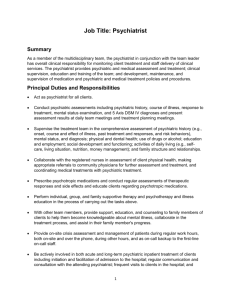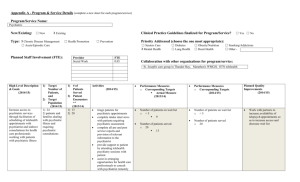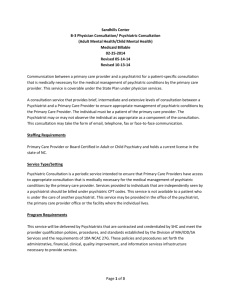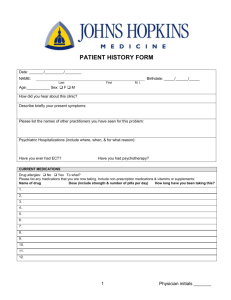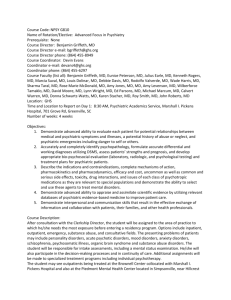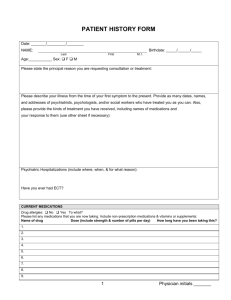OhioHealth_Change-Maker_Attachment
advertisement
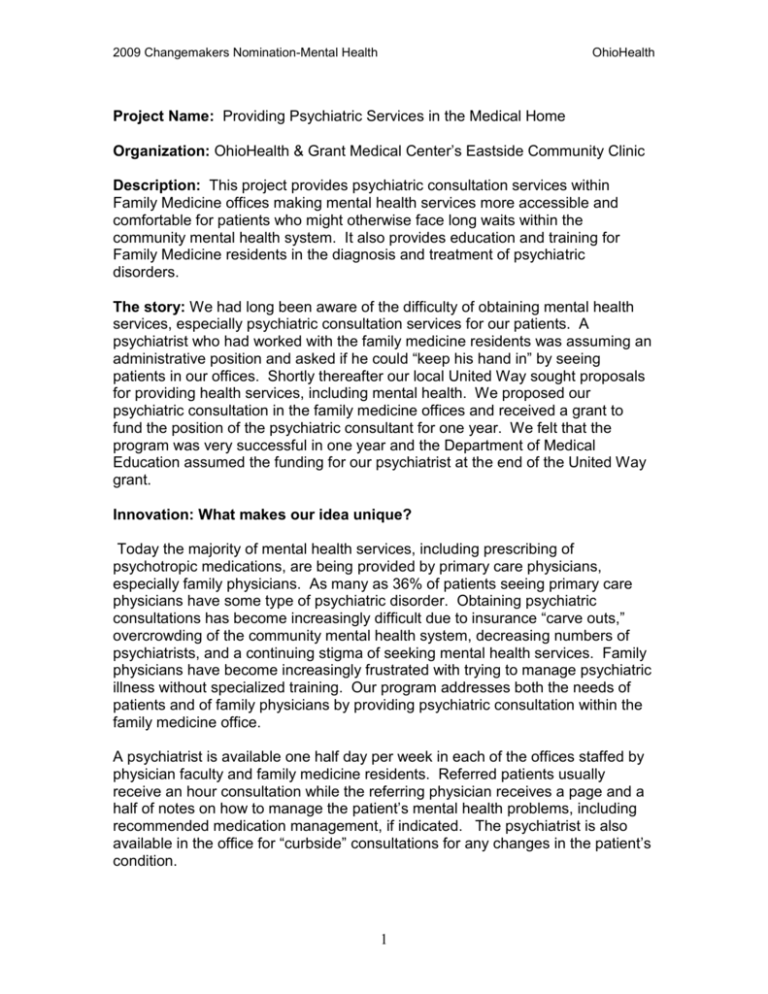
2009 Changemakers Nomination-Mental Health OhioHealth Project Name: Providing Psychiatric Services in the Medical Home Organization: OhioHealth & Grant Medical Center’s Eastside Community Clinic Description: This project provides psychiatric consultation services within Family Medicine offices making mental health services more accessible and comfortable for patients who might otherwise face long waits within the community mental health system. It also provides education and training for Family Medicine residents in the diagnosis and treatment of psychiatric disorders. The story: We had long been aware of the difficulty of obtaining mental health services, especially psychiatric consultation services for our patients. A psychiatrist who had worked with the family medicine residents was assuming an administrative position and asked if he could “keep his hand in” by seeing patients in our offices. Shortly thereafter our local United Way sought proposals for providing health services, including mental health. We proposed our psychiatric consultation in the family medicine offices and received a grant to fund the position of the psychiatric consultant for one year. We felt that the program was very successful in one year and the Department of Medical Education assumed the funding for our psychiatrist at the end of the United Way grant. Innovation: What makes our idea unique? Today the majority of mental health services, including prescribing of psychotropic medications, are being provided by primary care physicians, especially family physicians. As many as 36% of patients seeing primary care physicians have some type of psychiatric disorder. Obtaining psychiatric consultations has become increasingly difficult due to insurance “carve outs,” overcrowding of the community mental health system, decreasing numbers of psychiatrists, and a continuing stigma of seeking mental health services. Family physicians have become increasingly frustrated with trying to manage psychiatric illness without specialized training. Our program addresses both the needs of patients and of family physicians by providing psychiatric consultation within the family medicine office. A psychiatrist is available one half day per week in each of the offices staffed by physician faculty and family medicine residents. Referred patients usually receive an hour consultation while the referring physician receives a page and a half of notes on how to manage the patient’s mental health problems, including recommended medication management, if indicated. The psychiatrist is also available in the office for “curbside” consultations for any changes in the patient’s condition. 1 2009 Changemakers Nomination-Mental Health OhioHealth The physicians, most of whom are residents, learn to diagnose psychiatric disorders more precisely and use psychotropic medications more selectively. This training expands the services provided within communities as residents complete the program and move into private practices throughout the country. Impact: Behavioral Issues, mental health (substance abuse, wellness, men’s issues, women’s issues, aging issues, health care) In the first year of our program approximately 175 patients ranging in age from 14 to 96 were seen in the office for psychiatric consultation. Of this number, the majority received some type of governmental or charity care coverage or were private pay who would have been referred to the community mental health system. These patients received an earlier intervention for their psychiatric disorders than they would have had they been referred to the community system. Treatment plans were developed in consultation with the psychiatrist and as part of the medical record were readily accessible to the family physician. Embedding the psychiatrist in the medical home normalized the mental health experience for the patient and removed a question of stigma for receiving these types of services. Working collaboratively with a psychiatrist increased the family physicians’ skill and comfort in diagnosing and treating psychiatric disorders, including use of psychotropic medications, in their office. The primary problem which our program is addressing is the difficulty in obtaining mental health services, especially psychiatric consultations, for many people within the community. Insurance “carve outs,” complicated referral systems, an overburdened community mental health system, and a shortage of mental health providers, especially psychiatrists, have forced many patients to seek mental health services from their family physician. While family physicians have some training in psychiatry and behavioral medicine, most do not feel comfortable in managing psychiatric disorders, especially the use of psychotropic medications, without further training. As a result many mental health problems are often under-diagnosed and under-treated. Our program has made a psychiatrist available to provide consultation services within the medical home. Referrals are made from the family medicine office population and the patient is seen in a timely way within the familiar setting of their family physician’s office. The physician receives an extensive consultation report with treatment recommendations, including medications, if indicated. This report is part of the patient’s medical record so that it is accessible to the attending physician and there is no need to wait for records to be sent from another facility. At the same time access to the psychiatrist for ongoing management questions improves physician confidence in handling psychiatric disorders in the office setting. We also received a grant to provide an educational 2 2009 Changemakers Nomination-Mental Health OhioHealth workshop on the diagnosis and treatment of psychiatric disorders in the office setting to physicians in the community,. The results include: 1) More timely psychiatric consultations so that treatment plans can be developed and implemented quickly; 2) Increased patient compliance with recommended psychiatric consultation; 3) Increased family physician knowledge and confidence in diagnosing and treating psychiatric disorders, including use of psychotropic medications, in the family medicine office; 4) Modeling of collaborative care for psychiatric disorders and for medical problems with a psychiatric component. To be more successful over the next three years our project would need: Year One: Increased psychiatrist time to provide more consultation services within the family medicine centers. Ideally, the addition of a child/adolescent psychiatrist would expand the services which could be offered and could provide increased physician education in this specific area. Year Two: Include an additional counselor in the offices to provide ongoing services for patients requiring a longer term intervention. Year Three: Expand the service to include other physician offices within the community. Provide continuing education for physicians in the community. We would hope that our project would encourage communities to look at this model for delivery of mental health services in the medical home. The concept of the medical home is now being promoted and encouraged and mental health is an important part of that concept. Sustainability: Three most important actions needed to grow the initiative are: 1) Increase the availability of the psychiatrist and include a child/adolescent consultant 2) Add a counselor/psychiatric social worker to engage patients in longer term follow-up 3) Provide community and professional medical education regarding diagnosis and treatment of psychiatric disorders. 3 2009 Changemakers Nomination-Mental Health OhioHealth Awards and honors: Grant awards from United Way of Central Ohio, and The Columbus Foundation. Featured article in Family Practice News and several presentations at national conferences 4
